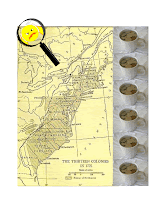Another philosophical question a person may honestly ask is:
- Do I exist?
“Who said that?” Okay, that’s the rhetorical question if we want to be funny.
Seriously though, do we exist? Of course, but let’s review.
We first ask… “What do you mean by that?”
We then ask… “How did you come to that conclusion?”
We continue to listen and ask follow-up questions. (Remember the mean face with covered ears and the magnifying glass.)
If the person claims they do not exist, ask “How does someone who does not exist question their existence?”
If you even suspect you don’t exist, you can know you do exist because you must exist to ask the question. If you didn’t exist, you couldn’t question your existence. To know you do not exist requires you to exist to know this as fact. Therefore, existence is necessary to question non-existence. (My head hurts.)
René Descartes (1596-1650), in his Discourse on Method (1637) summed up the answer to whether or not we exist when he concluded, "I think, therefore I am" (Original French, "Je pense, donc je suis"; Latin, "Cogito, ergo sum"; English "I am thinking, therefore I exist").
We can reach the same conclusion through deduction. A deductive argument if formed by reasoning from the general to the specific. The tool we can use is the syllogism which is constructed with a general proposition (called the major premise), a more specific proposition (called the minor premise), followed by the conclusion. A syllogism that would support Descartes’ conclusion might look something like this:
We could say the same thing a little differently:
Let me make a quick note here: Fictional characters may be said to ponder their existence, however it is not the fictional character that ponders but their non-fictional human creator. For instance, Popeye said, “I yam that I yam, and that’s all that I yam.” But the cartoon character Popeye only existed in the mind of his creator and readers.
Do I exist?
We can know we exist (I exist), as one must exist to ponder one’s possible nonexistence.
- Do I exist?
“Who said that?” Okay, that’s the rhetorical question if we want to be funny.
Seriously though, do we exist? Of course, but let’s review.
We first ask… “What do you mean by that?”
We then ask… “How did you come to that conclusion?”
We continue to listen and ask follow-up questions. (Remember the mean face with covered ears and the magnifying glass.)
If the person claims they do not exist, ask “How does someone who does not exist question their existence?”
If you even suspect you don’t exist, you can know you do exist because you must exist to ask the question. If you didn’t exist, you couldn’t question your existence. To know you do not exist requires you to exist to know this as fact. Therefore, existence is necessary to question non-existence. (My head hurts.)
René Descartes (1596-1650), in his Discourse on Method (1637) summed up the answer to whether or not we exist when he concluded, "I think, therefore I am" (Original French, "Je pense, donc je suis"; Latin, "Cogito, ergo sum"; English "I am thinking, therefore I exist").
We can reach the same conclusion through deduction. A deductive argument if formed by reasoning from the general to the specific. The tool we can use is the syllogism which is constructed with a general proposition (called the major premise), a more specific proposition (called the minor premise), followed by the conclusion. A syllogism that would support Descartes’ conclusion might look something like this:
- Pondering the self’s existence is done only by existing beings. (major premise)
I ponder my existence. (minor premise)
Therefore, I exist. (conclusion)
We could say the same thing a little differently:
- Pondering the self’s existence is done only by real beings.
I ponder my existence.
Therefore, I am real (am a real being).
Let me make a quick note here: Fictional characters may be said to ponder their existence, however it is not the fictional character that ponders but their non-fictional human creator. For instance, Popeye said, “I yam that I yam, and that’s all that I yam.” But the cartoon character Popeye only existed in the mind of his creator and readers.
Do I exist?
We can know we exist (I exist), as one must exist to ponder one’s possible nonexistence.

No comments:
Post a Comment